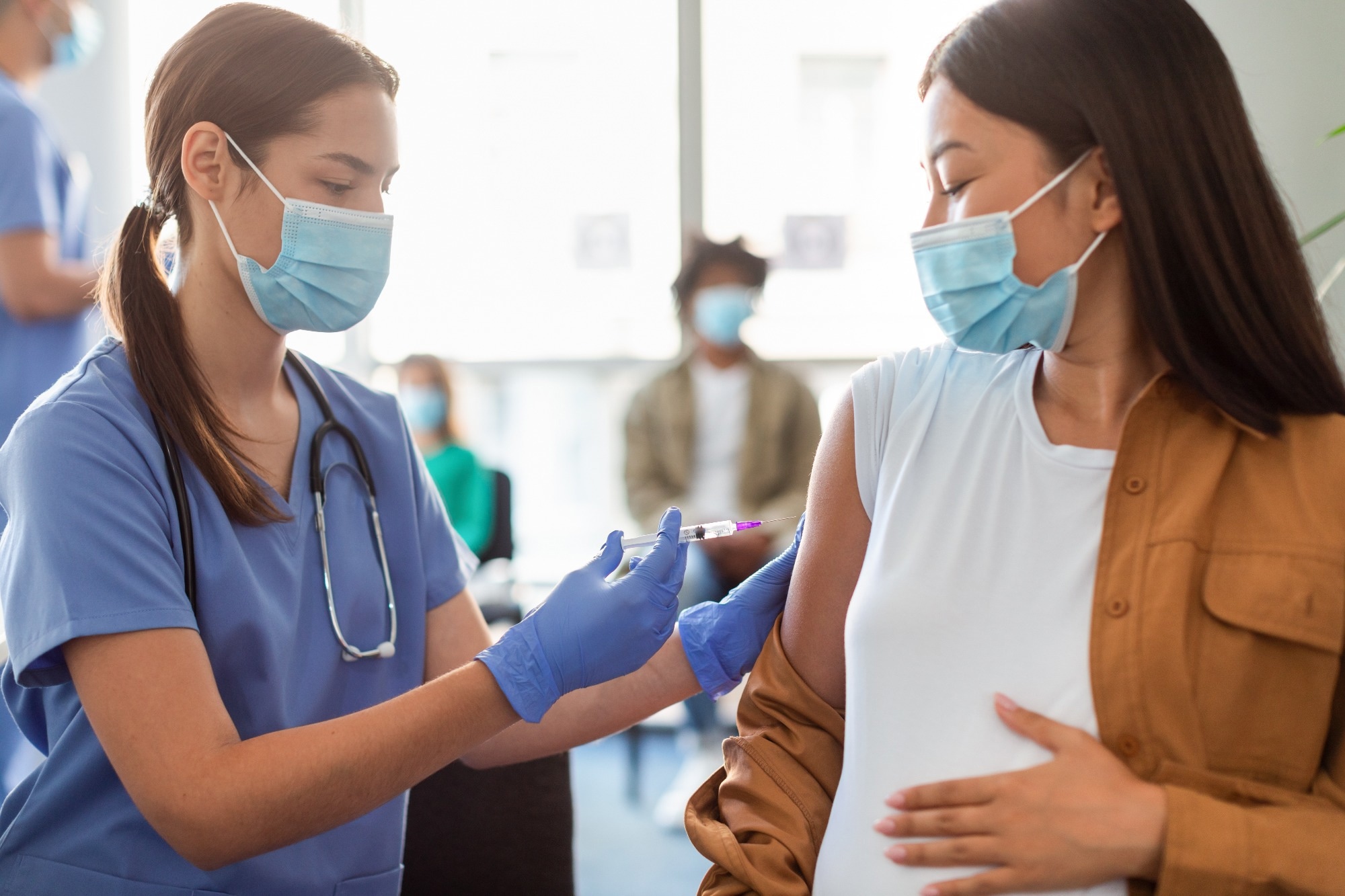In a recent study published in the journal JAMA Pediatrics, researchers carried out a large cohort study to investigate the association, if any, between in-utero exposure to COVID-19 vaccination and subsequent neurodevelopmental delay in infants. The cohort comprised 2,261 and 1,940 babies ages 12 and 18 months, respectively, with the Ages and Stages Questionnaire used to assess neurodevelopment rates across five parameters. Mixed-effects logistic modeling of results failed to find significant differences between observed and expected neurodevelopmental rates, highlighting the safety of COVID-19 vaccines administered during pregnancy on the neurological health of offspring.
 Study: In Utero Exposure to Maternal COVID-19 Vaccination and Offspring Neurodevelopment at 12 and 18 Months. Image Credit: Prostock-studio / Shutterstock
Study: In Utero Exposure to Maternal COVID-19 Vaccination and Offspring Neurodevelopment at 12 and 18 Months. Image Credit: Prostock-studio / Shutterstock
The burden of COVID-19 and an understudied vaccine recipient group
The coronavirus disease 2019 (COVID-19) pandemic represents an unprecedented loss of human life and economic collapse. Since its emergence in Wuhan, China, in late 2019, the virus has been responsible for a death toll of nearly 7 million, with more than 700 million individuals infected thus far. The medical and scientific panic induced by the pandemic spurned intensive research for a means to combat the disease, either by curing it or preventing its acquisition/transmission, resulting in the rapid development of anti-viral vaccines against the condition’s causative pathogen – the severe acute respiratory syndrome coronavirus 2 (SARS-CoV-2).
Despite extensive fast-track preclinical trials of prospective vaccines, a focal risk group, namely pregnant women, was excluded from large-scale clinical trials due to mounting concerns over the negative impacts of vaccines on mothers and their to-be offspring. Even now, following the acute pandemic phase, little literature is available on the outcomes of during-pregnancy vaccinations for the next generation.
“Sources of vaccine hesitancy include unknown risks to the fetus. Although a popular concern linking childhood vaccination and risk of autism spectrum disorder has been debunked, misinformation persists.”
A popular argument against maternal vaccination is potential developmental issues with their offspring, with neurodevelopmental disorders the most often cited. Historically, vaccinations against influenza and rubella have been observed to have long-term, often life-long, adverse impacts on the neurological and psychiatric health of individuals with in-utero exposure. The trickle-down effect of this ‘vaccine hesitancy’ is arguably the most significant factor in the dearth of knowledge and overabundance of misinformation regarding vaccination reception during pregnancies.
Despite being poorly studied in the context of COVID-19 vaccinations, neurodevelopmental disorders have been well-characterized. The term refers to a cohort of behaviorally defined conditions typically characterized by the early emergence of cognitive, language, motor, or social development abnormalities.
“A range of genetic and environmental factors may underlie neurodevelopmental disorders, and fetal exposure to maternal inflammation represents a potential source of risk that has found increasing support from converging lines of epidemiologic and animal model evidence.”
About the study
In the present study, researchers used data from a large prospective study representative of the United States of America (US) and Puerto Rico, comprising 2,487 mothers and 4,201 infants. Methodologies and outcomes are reported using the Strengthening the Reporting of Observational Studies in Epidemiology (STROBE) reporting guidelines. Participant recruitment was conducted between May 2020 and August 2021 and initially comprised 7,880 individuals. Study inclusion criteria included age (above 18 years) and questionnaire completion status.
Data collection comprised demographics (including self-reported ethnicity), medical history (including SARS-CoV-2 infection status), vaccination status (including type of vaccine received and number of booster doses), and three questionnaires. The Ages and Stages Questionnaire, third edition (ASQ-3), was used to measure the infants’ outcomes of interest – five parameters encompassing the five neurodevelopmental subdomains: 1. Communication, 2. Fine motor, 3. Gross motor, 4. Social-, and 5. Problem-solving skills. The Patient Health Questionnaire (PHQ-9) and Generalized Anxiety Disorder (GAD-7) questionnaires were used to measure maternal outcomes.
Vaccination, either with mRNA vaccines or viral-vector vaccines, was considered the study exposure. Mixed-effects logistic regression models constituted statistical analyses and were used to reveal the relationship between vaccination and subsequent neurodevelopment.
Study findings
Of the 7,780 participants who initially enrolled in the study, 2,487 met the inclusion criteria and were included in the analyses. Most participants identified as White (89.3%) with a mean age of 33 years. 68% of participants reported receiving vaccinations during their pregnancy, 76.2% of which were mRNA vaccinations.
Notably, this study could not reveal any association between in-utero COVID-19 vaccine exposure and subsequent adverse neurodevelopment (stunted or delayed) outcomes. Encouragingly, neither offspring nor their mothers were found to experience any unexpected neurological outcomes, even when adjusting models to account for demographics and medical histories. SARS-CoV-2 infection status was also observed to have no significant bearing on the rate of neurodevelopment.
These findings highlight the importance of ongoing extensive prospective studies, especially in newborns and infants, to improve real-time mother and child care.
“As our basic science colleagues tease out the dynamic mechanistic underpinnings of in-utero exposures, together we can transform these early data into knowledge to promote the health and well-being of our communities.”